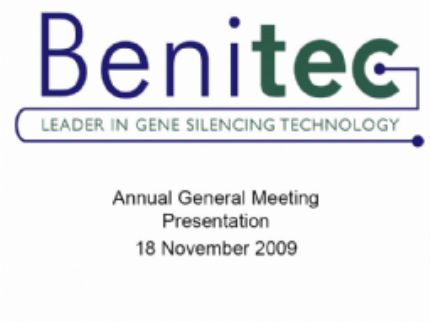Melbourne, Feb 9, 2009 AEST (ABN Newswire) - Leading developer of RNA interference (RNAi)-based therapeutics Benitec Limited (ASX:BLT)(PINK:BNIKF) announced today that there had been unprecedented interest in the update on the City of Hope HIV trial recently presented in the USA.
Findings from the trial were presented at the Stem Cell World Congress in Palm Springs, California on 20 January 2009 by Dr David DiGiusto, Director of haematopoietic cell therapies at City of Hope Medical Centre in Duarte, California.
The presentation was entitled "A Pilot Study of Safety and Feasibility of Stem Cell Therapy for AIDS Lymphoma Using Stem Cells Treated with a Lentivirus Vector Encoding Multiple anti-HIV RNAs"
The key findings presented at the meeting were that the isolation, genetic modification (with Lentiviral vector) and infusion of CD34+ cells from ARL patients is safe and feasible.
Gene marking in vivo was within the expected range predicted by in vitro analysis of transduced CD34+ cells and gene marked cells persist (and express siRNA) for up to 10 months post infusion.
"We are trying to prevent the immunodeficiency that is a result of HIV infection. It is still an experimental treatment at the moment, but we hope that eventually we will be able to give Aids patients just one transplant and that would then protect them for life. We have data to show that the resistant cells are persisting in our lymphoma patients" said Dr DiGiusto.
The technique involves isolating genes which curb the spread of HIV inside the body, introducing the genes into human stem cells in a laboratory, then transplanting the stem cells into a patient's bone marrow. "What the scientist did here was to genetically modify fraction of the patient's stem cells with genes that target three different aspects of HIV that allow it to get into the immune cells and replicate. When those stem cells are transplanted into patients, they create mature immune cells that circulate in the patient and protect against HIV. This study has shown that we can deliver gene modified cells which have the potential to limit the HIV infection. If we can continue to develop this approach and successfully apply it to other AIDS patients, then genetic therapy for HIV could become a reality", said Sue MacLeman, CEO Benitec Limited.
The early results have been welcomed by Aids and HIV charities who have described the experimental treatment as "promising".
Around 40 million people worldwide are infected with HIV and an estimated three million die each year with the virus. In the UK there are 73,000 people who are living with HIV and in recent years a growing number of heterosexuals have been diagnosed with the infection.
HIV, which is a sexually-transmitted infection, attacks white blood cells known as Tlymphocytes, which play a central role in the immune system by fighting other forms of infection.
Over time the number of T-lymphocytes in the body decreases as the virus spreads and the immune system stops working, leading to the condition known as Auto-Immune Deficiency, or Aids, meaning patients are no longer able to fight off infections themselves.
Most Aids patients die from pneumonia or cancers such as lymphoma. Bone marrow contains stem cells that are capable of forming all types of blood cells including the white blood cells that form part of the immune system.
By giving patients stem cells that carry these anti-HIV genes, the patients' bodies are able to produce new white blood cells that are resistant to attack from HIV and so able to defend the body from other forms of infection.
This pilot feasibility study is supported through a collaboration between Benitec and City of Hope and is Benitec's first human trial. The trial uses a triple therapy delivered using a lentiviral vector developed at City of Hope in the laboratories of Dr. John Rossi and Dr. John Zaia. The rHIV7-shl-TAR-CCR5RZ vector suppresses HIV by expressing three nucleic acids that are directed against key steps in HIV replication.
The Study
The study with City of Hope is entitled, "A pilot study of the safety and feasibility of stem cell therapy for AIDS lymphoma using stem cells treated with a lentiviral vector-encoding multiple anti-HIV RNA's."
The pilot study is designed to determine the safety and feasibility of RNA-based anti-HIV therapy with lentivirus-transduced hematopoietic progenitor cells (HPC) in patients undergoing autologous hematopoietic stem cell transplantation (HCT) for intermediate and high grade AIDS lymphoma.
The lentivirus vector encodes three forms of anti-HIV RNA: RNAi in the form of a short hairpin RNA (shRNA) targeted to an exon in HIV-1 tat/rev (shI), a decoy for the HIV TATreactive element (TAR), and a ribozyme that targets the host cell CCR5 chemokine receptor (CCR5RZ). The vector, used to transduce autologous CD34-selected HPC, is called rHIV7-shI-TAR-CCR5RZ and was manufactured by the Center for Biomedicine and Genetics at City of Hope.
Following standard mobilization of HPC and collection by apheresis (HPC-A), a portion of the cells were cryo-preserved and left unmanipulated for later use as treatment. The remaining portion of the cells were enriched for CD34+ cells, cryo-preserved, and later genetically modified by infection with rHIV7-shI-TAR-CCR5RZ.
The subjects underwent conditioning therapy and at the time of autologous HCT, the rHIV7-shI-TAR-CCR5RZ transduced cells were infused, followed 24-hrs later by the infusion of untransduced autologous HPC-A.
Contact
Sue MacLeman
Chief Executive Officer
TEL: +61-437-211-200
| ||
|






